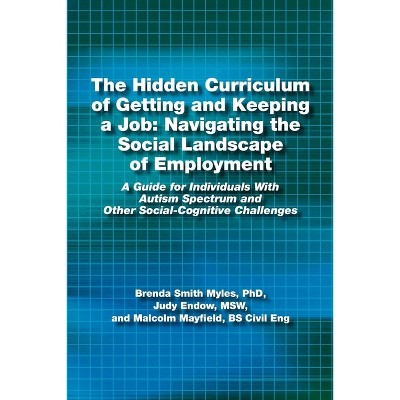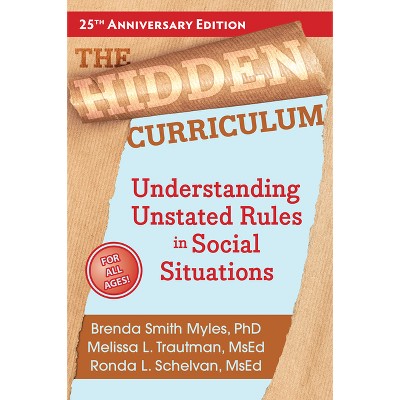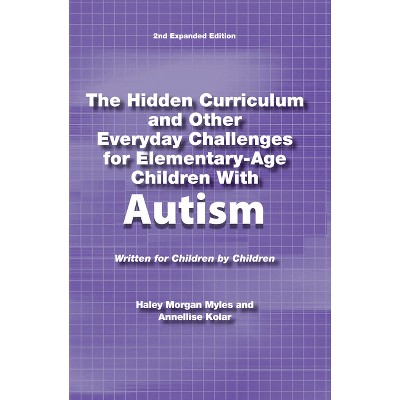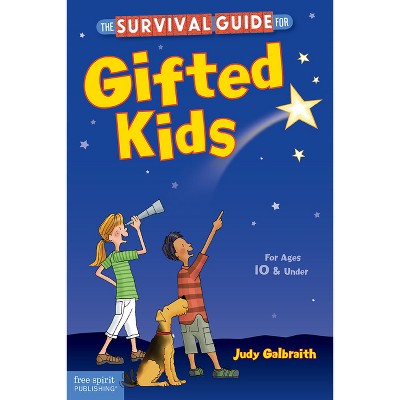Sponsored

Learning the Hidden Curriculum - by Judy Endow (Paperback)
In Stock
Sponsored
About this item
Highlights
- Drawing from her personal experiences, Judy Endow, author of the "2010 and 2011 Hidden Curriculum Calendars," provides lots of hidden curriculum items that pertain to most areas of adult life.
- Author(s): Judy Endow
- 112 Pages
- Education, Special Education
- Series Name: Hidden Curriculum
Description
Book Synopsis
Drawing from her personal experiences, Judy Endow, author of the "2010 and 2011 Hidden Curriculum Calendars," provides lots of hidden curriculum items that pertain to most areas of adult life. In relating how she personally has learned to more successfully maneuver social interactions, she also presents a framework for developing the ability to more quickly assess a situation and take steps to avoid making social blunders BEFORE they have been committed. A sampling of strategies includes Pause and Match, Laugh Along, Recognized and Expand Black-and-White Thinking, and It Is Not Necessary to Report All My Truths. Judy's framework enables readers to learn to create their own social "rules" and, as a result, live freer, more successful lives. The fact that the book is written by an autistic person who has learned by trial and error makes it all the more valuable.Review Quotes
"Judy is magical in her approach to helping so many living with autism. This is a must-read book for those living with autism, family members and those who want to know more about autism. Thank you, Judy!" - Scott Badesch, president, Autism Society of America
"I love this book!! It offers practical, thoughtful and illuminating advice from an older autistic adult. Her user-friendly system for avoiding social embarrassment helps people with autism decode the social world, categorize the type and severity of social blunders and, as the author puts it, 'figure out proactive strategies to cut down on social embarrassment.' The book is well written, easy to read and (at times) belly- laughingly funny. I heartily recommend Learning the Hidden Curriculum: The Odyssey of One Autistic Adult to people with autism from preteens through adults, to the professionals who work with them and the families who love them." - Dorothy Siegel, MPA, project director, ASD Nest Support Project, Steinhardt School of Culture, Education and Human Development, New York University
"Learning the Hidden Curriculum: The Odyssey of One Autistic Adult provides readers with a perspective that is critical to anyone who works with, cares for or educates a person with autism. Before we can apply the knowledge that research and technology have given us, we must first hear the stories that offer insight into how people with autism think. Through her personal journey to understand a neurotypical world, Judy is able to educate the educators on how people with autism think as well as provide a guide to people with autism on how they too can learn to crack the code of the 'hidden curriculum.'" - Daniel Parker, MA/MS, autism consultant, Wisconsin Department of Public Instruction
"Learning the
Hidden Curriculum is a wonderful book designed to teach adults with autism spectrum disorders positive strategies to help guide them through an ever- changing and often confusing social world. Judy Endow not only provides hundreds of examples of these 'unstated rules, ' she also teaches ways that have helped her 'crack the code.' She does all of this in a humorous, positive way, concentrating on the fact that even NTs(neurotypicals) would benefit from these strategies." - Debra A. Kern, MS, counselor, Overland Park, Kansas
"Judy's voice comes through loud and clear. Reading Learning the Hidden Curriculum is like sitting on the couch listening to a trusted friend. I believe any youth or adult can benefit from Judy's experience of building a framework for navigating
the otherwise invisible matrix of social interactions." - Janine M. Collins, MTS, MSW, research associate, Center for Community Inclusion and Disability Studies, consultant, Autism Research Institute, and co-developer of Quality Employment Practices for Supporting Individuals with Autism Spectrum DisordersShipping details
Return details
Trending Non-Fiction











